HomeReviewsThe Crush House
The Crush House review: sassiety of the spectacleManiac McMansion
Maniac McMansion
Image credit:Devolver / Rock Paper Shotgun
Image credit:Devolver / Rock Paper Shotgun
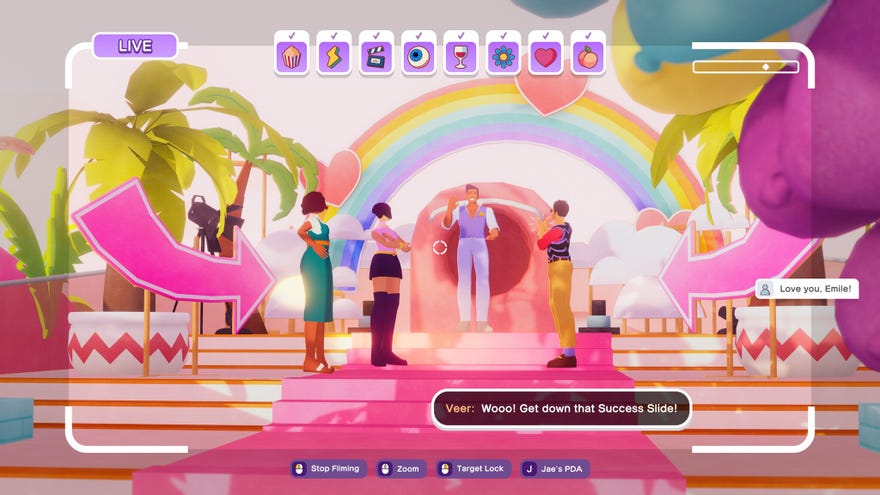
In the past I’ve describedThe Crush Houseasa parody of reality TV, but that’s not how I feel about the game I’ve reviewed. The description fits the premise, of course: in this sunny first-person hybrid ofmanagementgame, roguelike and immersive sim, you are the sole camerawoman for a 90s reality TV show that takes place on an island off the coast of Malibu. Seasons of the show last a week, each beginning with the selection of a four-person cast from a pool of 12 characters. The characters cover a range of obnoxious archetypes, from rosy-cheeked prudes to swaggering gym rats, all of whom look like slightly spaghettified versions of the Sims.
The Crush House | Coming to PC August 9 | Demo Available NowWatch on YouTube
The Crush House | Coming to PC August 9 | Demo Available Now

There are callbacks to many reality TV shows in The Crush House, more than I can pin down. The mansion soundtrack of watery nu-metal and R&B is pure MTV (you can change the muzack to appease certain audiences). The characters hold up a mirror to everybody from Nasty Nick to the Kardashians. But I’m not sure this game is about nostalgia for reality TV, in practice. It’s about Content, in the present-day, always-online sense of the term - delicious, amorphous, disembodied content. Content, coursing through the pipes of the Success Slide. Content, dripping with an audible glug-glug into the audience icons on your feed.
Image credit:Devolver / Rock Paper Shotgun
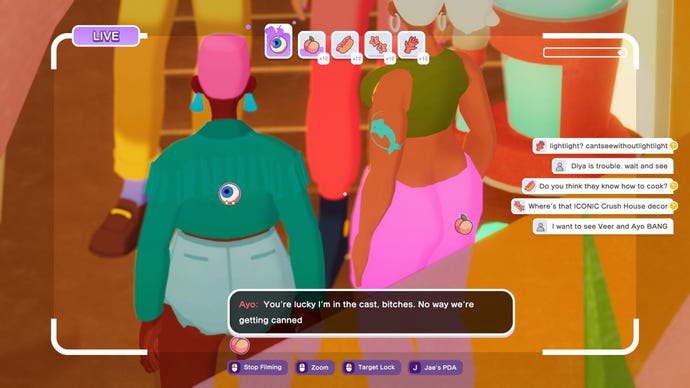
The act of finding creative angles to shoot from is akin to finding a good sniping spot or obscure route inDishonored, and the game is surprisingly parkour-friendly, with a running jump and (fiddly) auto-ledge grab. The Crush House itself is compact and relentlessly transparent, made up of plate glass and doorless alcoves - a panopticon with a conversation pit. You’ll memorise the layout in no time. But the movement of the characters, the buying of props, and the scrambling of audience demographics perform small acts of reinvention from episode to episode. There’s a wealth of authentically bitchy writing in the game, with lines for every combination of cast members, and part of the job is obviously matching up people who are likely to have chemistry of one kind or another.
Image credit:Devolver / Rock Paper Shotgun
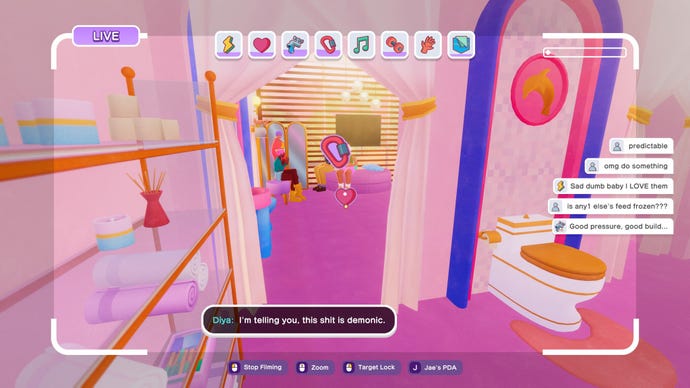
You might call this a failure of the game’s simulation of reality TV. While I can’t quite speak to the developer’s intentions, I think it’s actually a very successful representation of how our networked entertainment sphere has slyly squeezed out both human agency and increasingly, human spectatorship. Again, it feels more like a commentary on Content, on Thinking With Data and in particular, on generative AI.
Rather than just lampooning the preening idiots who find their way onto reality TV shows, the game takes aim at how today’s digital economy hoards and regurgitates information based on its own, undead modelling of curiosity and desire. It encourages you to behave not like a gossip or a peeping Tom but a sexless and soulless CAPTCHA drone, orienting itself to isolate fixtures that fit the target metrics. When I film people on the loo, or while they’re kissing, or while they’re visibly distressed, it’s not because I’m a paparazzo aiming to titillate or scandalise or force some empathy. I don’t see the “talent” at all, just taggable hues or attitudes that need to be converted into numbers.
I’m linking this to the present-day digital content economy, but the themes above took shape in the 1960s. Guy Debord writes about something similar inThe Society Of The Spectacle, describing how “the specialization of images of the world has culminated in a world of autonomized images where even the deceivers are deceived” - a capitalist endgame in which everybody’s alienation from everybody else is total, and the system of production and representation operates without instruction or interruption, bestowing agency on spectacular commodities rather than the gloomy consumer-labourers doomed to traipse back and forth between workplace and marketplace. The Crush House is Debord’s “vicious circle of isolation” in miniature. It is a place of zero privacy and yet, absolute loneliness: everybody present is faking it, and the economic systems that structure this syrupy pocket of spacetime do not regard the participants as people.
Having taught you to behave like a drone, The Crush House turns the screws. It’s a surprisingly difficult experience, with a constipated mid-game. You can’t see which audience types will surface during a season, and certain combinations of cast and viewing demographic are nigh-incompatible. Hard to do much for a viewership that wants to ogle the lads when you have an all-girl season, for example.
Image credit:Devolver / Rock Paper Shotgun
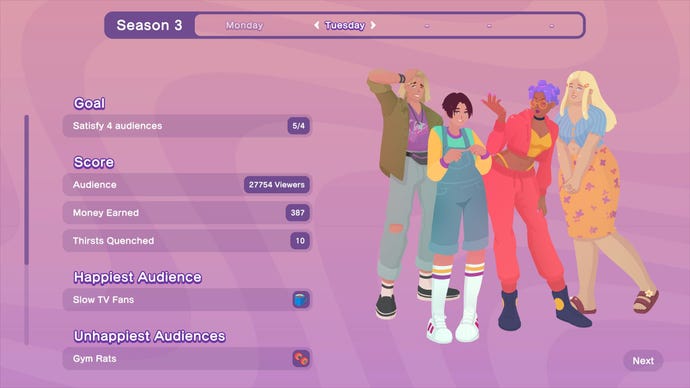
There’s the option of playing on Easy, which does away with the threat of cancellation, but that’s not the “recommended” setting, and I do think The Crush House needs its grind for thematic purposes. The lesson you’re supposed to learn, I think, is that being good at your thankless, dehumanising job will only cause management to expect more from you. The challenge is to do your job well enough to survive, while pursuing somethingotherthan your job. Not just the foetid secrets of the Crush House itself, but the possibility of genuine community with the people inside it.
Image credit:Devolver / Rock Paper Shotgun
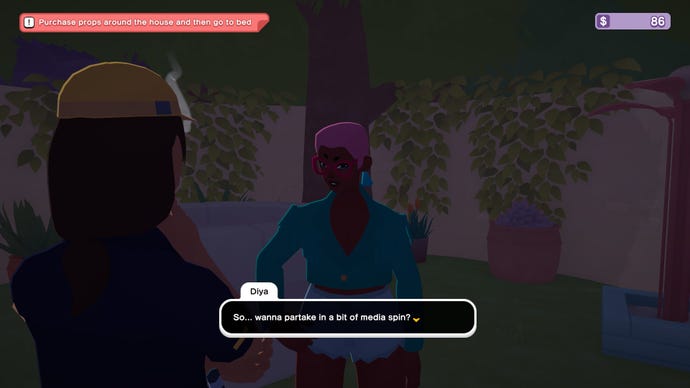
These favours aren’t exactly Hero’s Quests, and fulfilling them can be maddening given all the other pressures. There’s one that requires you to avoid filming butts for a whole episode, which I attempted several times only for a rogue buttock to sneak its way into the screen corner at the last second. The game gives you the option of turning requests down, even scornfully. But helping other people is helpful for you. Amongst other things, it triggers additional encounters, unlocking the way to other areas deep beneath The Crush House, which harbour the hope of escape.
I’m going to break it off here - partly because after 10 hours, I’m still plumbing those depths, and partly because I’m not sure any plot catharsis can exorcise the demons this game conjures. It feels perversely appropriate to leave The Crush House unfinished: we may be able to escape from The Crush House, but I’m not sure we can escape from the idea of The Crush House, not while there is Content to generate.
Inevitably, reviewing the game has made me think about my own job in content creation, aka video game journalism - how the mechanics of my trade teach me to treat readers as aggregates of preferences and compulsions, and the importance of repeatedly carving out some headspace for sympathy and community. I’m not sure The Crush House is enjoyable, beyond the opening thrill of wielding the lens and toying with the systems, but it is enlightening. It is a triumphant performance of dystopia, one that concentrates the understanding rather than merely wallowing in the shit. It takesenormousinsight to make something this ugly.